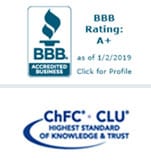Many of us have a bucket list, or even a few thoughts about what we want to accomplish in life. But have you ever thought about a financial bucket list? A financial bucket list is a list of things we want to accomplish before we “kick the bucket.” Just like skydiving and traveling the world, your financial bucket list should contain goals that are lofty yet attainable. Setting these goals and taking control can help you feel more secure in your financial situation. Here’s what should be on your list:
1. Create a 6-Month Emergency Fund
Whether it’s a broken car window or a leak in your basement, life happens—usually without consulting your checkbook. That’s why it’s important to create an emergency fund to cover unexpected expenses. Unfortunately, about 57 million Americans have no emergency savings. Even worse: nearly a third of baby boomers have no money saved– a dangerous position to be in close to retirement. We recommend that you keep enough money in your emergency fund to cover 6 months of expenses. Start small by saving $10-$20 a week and work your way toward saving 15% of every paycheck. Set up an automatic withdrawal from your paycheck into a separate savings account.
2. Have a Perfect Credit Score
Looking to buy a car or rent an apartment? You’ll need a solid credit score. And, if you want to get the best rate on any loans you might need for those investments, you’ll need a credit score that’s beyond passable. However, according to the Fair Issac Company, less than 1% of Americans have a perfect 850 credit score. And with the average balance-carrying household a little over $16,000 in debt, it’s no wonder Americans find that perfect score so elusive. An 850 credit score might sound extreme, but like any good bucket list, your financial goals should be aspirational. A great way to start on this one is to check your credit report. You can get a free annual report from each of the three major credit bureaus. Look your report over for mistakes and dispute any errors before they become a big concern.
3. Be Debt-Free
Speaking of debt, it’s important to enter retirement debt-free. For boomers, the biggest offenders are credit cards, mortgages, student loans, and car payments. And yes, you did read that right: baby boomers in Connecticut alone have about $1.9 billion in student loan debt, often shouldered on behalf of their Millennial children and grandchildren. Debt can be one of the largest stressors when dealing with your finances. If it seems insurmountable, start small. Organize your credit card debt to determine which card has the lowest balance. Make the minimum payment on your other cards and work to pay off your smallest debt, then your next smallest debt until your credit cards are paid in full.
4. Own Your Home
If you’re ready to make a real dent in your debt, take a look at your mortgage. Right now, American financial institutions hold about $10 trillion in mortgage debt for family homes. Your bank doesn’t live in your house, so why should it own your house? A good way to work toward the goal of owning your home is to set a date that you want to have your mortgage paid off and stick to it. Be sure additional payments are going to your principal. Use this home mortgage calculator to get started.
5. Create a Financial Plan
Are you afraid of running out of money after you retire? This is one of the most common financial anxieties we hear from our clients. Retirement finances are complex and highly specific to your unique situation. That’s why it’s important to find a financial advisor who takes the time to know where your finances are and where you would like them to be 10, 20, and even 30 years down the road. Play an active role in your finances and work with your advisor to create a comprehensive financial plan that is appropriate for your age and risk tolerance. Your plan should cover everything from retirement income to long-term care and estate planning.
Edited by:

Sara McKinney
saractag@gmail.com
Sara is a recent graduate of Kalamazoo College and a new addition to the Cowen Team. Her responsibilities include IT support, event planning, and general administrative assistance.




